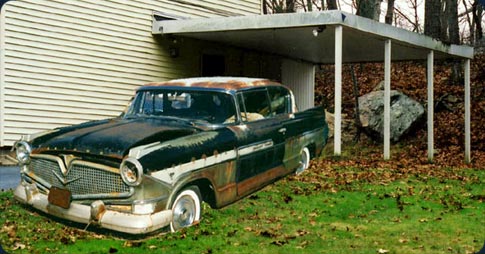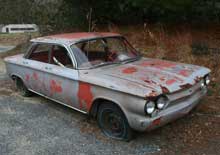Blowin' in the Wind
Ed Cole had a different idea. While competitors Ford and Chrysler were developing conventional compact cars in the late 1950s, Chevrolet general manager Cole instead channeled from Volkswagen. Instead of a front-engine, rear-drive water-cooled car, Chevrolet would build a rear-engine air-cooled design, but in keeping with American mores it would have six cylinders, not four. Thus was born the Corvair, introduced in October 1959.
There were just two body styles, a plain but modern sedan with GM's panoramic rear window, and a close-coupled coupe. The engine was a horizontally-opposed "boxer" six of 140 cubic inches and 80 bhp. Transmissions were three-speed manual or a version of Chevy's sturdy two-speed Powerglide. In the front was a fairly generous cargo space, although the spare tire intruded somewhat. Heating is notoriously difficult in air-cooled cars, so the Corvair used a gasoline-fired system. While sales could be described as decent, at barely 250,000 they were no match for Ford's Falcon (435,676) and only modestly surpassed Chrysler Corporation's Valiant (194,292). Cole, however, stole a page from Porsche's book with the Monza coupe, a tastefully-trimmed coupe with sporty appointments. It sold nearly 12,000 units, despite a late introduction.
For 1961, Corvair struck out in more directions. There was a new Lakewood station wagon, with a cargo deck over the engine, and a Greenbrier van-wagon that emulated the VW Microbus. In addition, a rampside pickup version of the Greenbrier was offered. Despite all this, the Monza coupe, with nearly 110,000 cars, outsold all other models. In 1962, the Monza was spiffed up with additional trim and sales topped 200,000. By this time, Chevy had a real Falcon and Valiant competitor, the entirely conventional front-engine, water-cooled Chevy II.
The 1963 line continued two late-1962 introductions, the Spyder, with a turbocharged engine making 150 bhp, and a convertible that was available with or without the Spyder engine (children, please do not jump from the car when it is in motion. The 1964 line offered yet another subtle trim variation, but the Corvair was about to become a folk celebrity, courtesy of a young lawyer from Winsted, Connecticut.
While first generation Corvairs are certainly collectible, derelict examples are not hard to find. The one heading this feature sits outside a restaurant in Preston, Connecticut. Devoid of all its trim, it's difficult to date. Dennis David, the CarPort's northwest Connecticut scout, reports that his territory is rife with crumbling Corvairs in need of salvation.

